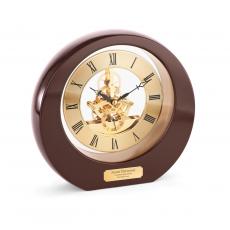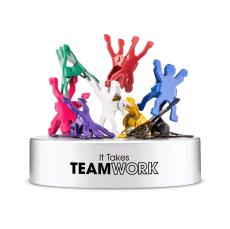Do Monetary Employee Appreciation Gifts Work?
In today's fast-paced business world, showing appreciation to employees has become essential for maintaining a motivated and productive workforce. While monetary rewards have traditionally been a popular choice for recognizing employee contributions, exploring a broader array of recognition items and methods is crucial. In this article, we'll delve into employee appreciation gifts, emphasizing why monetary rewards are not always the most viable solution and providing alternative ideas that can foster a more engaged and productive team.
Gift Cards: A Thoughtful Gesture
The ever-popular gift card is one of the most flexible and appreciated employee appreciation gifts. These tokens of appreciation come in various forms, from online shopping vouchers to dining or entertainment options. Gift cards allow employees to choose what appeals to them most, allowing for a personal touch in their rewards.
Gift cards can be significant when they align with an employee's interests or hobbies. For instance, a gift card to a bookstore for an avid reader or a spa voucher for someone needing relaxation can demonstrate a genuine understanding of individual preferences.
Bonuses: Short-Term Gratification
While monetary bonuses are a form of financial reward, they differ from routine salary payments, often tied to specific accomplishments or milestones. Offering performance-based bonuses can motivate employees to achieve their goals and exceed expectations. However, ensuring these bonuses are linked to clear, measurable objectives is essential to maintain fairness and transparency.
When considering bonuses as part of your employee appreciation strategy, remember that they provide a short-term boost in motivation. Employees may be encouraged to work harder to earn the bonus. Still, long-term job satisfaction relies on factors such as a positive work environment and growth opportunities.
Raises: Investing in Long-Term Commitment
Salary raises are a more permanent way of showing appreciation for your employees' dedication and hard work. When employees see that their efforts are recognized with increased compensation, it can foster loyalty and a sense of job security.
However, raises should be different from regular performance evaluations and feedback. Merit-based raises, tied to objective assessments of an employee's contributions, ensure the reward is justified and fair.
In the next section, we'll explore creative employee appreciation gifts that go beyond monetary rewards, emphasizing the importance of recognizing success in myriad ways.
Creative Employee Appreciation Gifts: Personal and Memorable
While monetary rewards can be practical, creative gifts can leave a lasting impression on employees and strengthen their emotional connection to the organization. Here are some unique employee appreciation gift ideas to consider:
Personalized Employee Recognition Awards: Create custom awards highlighting an employee's unique contributions and talents. These awards can be displayed proudly on their desks or walls, constantly reminding them of their achievements.
Work-Life Balance Perks: Show that you value your employees' well-being by offering flexible work arrangements, additional time off, or wellness programs. These benefits can significantly contribute to job satisfaction and employee retention.
Professional Development Opportunities: Invest in your employees' growth by providing opportunities for training, workshops, or certifications. This enhances their skills and signals your commitment to their long-term success.
Celebratory Events: Organize team-building events, outings, or parties to celebrate achievements and milestones. These gatherings create a sense of belonging and camaraderie among employees.
Handwritten Thank-You Notes: Simple yet powerful, a heartfelt thank-you note from a manager or colleague can make employees feel valued and appreciated.
Why Monetary Rewards Aren't Always the Best Choice
While monetary rewards have their place in employee appreciation strategies, they may not always be the best choice for several reasons:
Temporary Gratification: Monetary rewards offer immediate satisfaction but may not contribute to long-term employee engagement and loyalty. Employees may focus on short-term gains rather than the overall satisfaction derived from their work.
Risk of Entitlement: When monetary rewards become an expected part of the compensation package, employees may develop a sense of entitlement rather than viewing them as genuine tokens of appreciation. This can lead to dissatisfaction if rewards are reduced or eliminated.
Limited Impact on Motivation: Research in psychology and management suggests that non-monetary rewards, such as recognition, autonomy, and opportunities for growth, have a more substantial and lasting impact on employee motivation.
Equality Concerns: Equitably distributing monetary rewards can be challenging. Differences in roles, responsibilities, and performance may lead to perceived inequalities in reward distribution, causing employee tension.
Budget Constraints: For some organizations, providing substantial monetary rewards to all employees may not be financially sustainable. This can limit the effectiveness of monetary incentives as a recognition strategy.
Alternatives to Monetary Rewards
To foster a more engaged and productive team, consider the following alternatives to monetary rewards:
Regular Recognition: Implement a culture of frequent recognition where employees receive acknowledgment and praise for their contributions. A simple "thank you," or public recognition can boost morale and motivation.
Career Development: Provide opportunities for skill development, career advancement, and mentorship. Investing in employees' professional growth shows a commitment to their long-term success.
Flexible Work Arrangements: Offer flexible work options, such as remote work or flexible hours, to support work-life balance and enhance job satisfaction.
Wellness Programs: Promote employee well-being through wellness programs, gym memberships, or mental health support services.
Social Events: Organize team-building activities, outings, or events to strengthen team bonds and create a positive work environment.
Employee Involvement: Involve employees in decision-making processes and seek their input on organizational matters. This promotes a sense of ownership and engagement.
Personalized Gifts: Consider personalized gifts, such as customized company merchandise, as tokens of appreciation with sentimental value.
While monetary rewards have their place in employee appreciation strategies, they should not be the sole focus. To build an engaged and productive team, it's essential to recognize that employees are motivated by various factors, including recognition, personal growth, and work-life balance. By diversifying your approach to employee appreciation and considering alternatives to monetary rewards, you can create a workplace culture where employees feel valued, motivated, and invested in the organization's success. Remember, appreciation goes beyond the balance sheet—building meaningful connections and fostering a positive work environment.

































